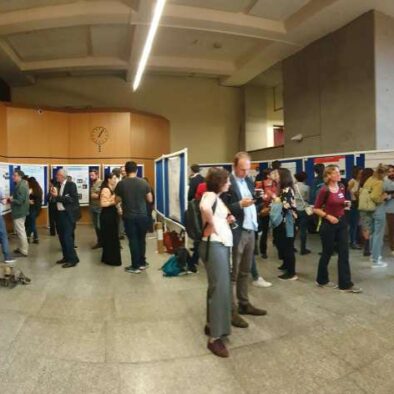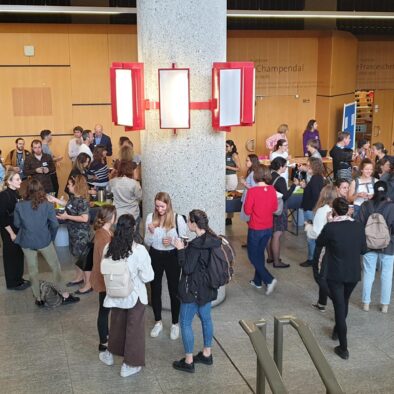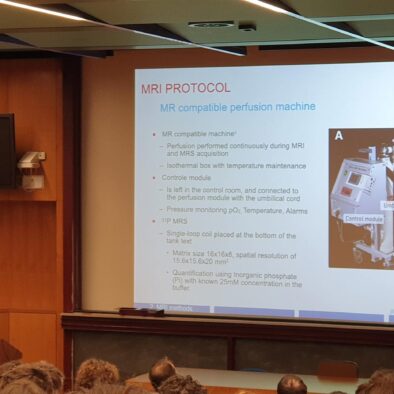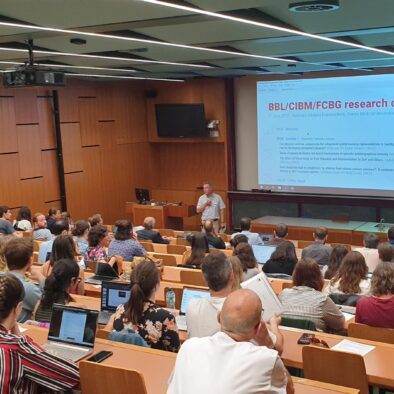On June 1, 2022, an annual BBL-CIBM-FCBG Research Day took place at the University Medical Center in Geneva gathering 135 attendees. The meeting was followed by the inauguration of a newly upgraded MAGNETOM Prisma Fit 3T MRI scanner located in the Brain Behaviour Laboratory, University of Geneva.
The event started with the opening remarks delivered by Francois Lazeyras, Head of the CIBM MRI HUG-UNIGE Clinical MR Imaging Section who welcomed the BBL team members responsible for the 3T MRI which has recently been integrated into the CIBM. The floor was then given to the experts from EPFL, UNIGE, and HUG involved in MRI projects and activities in the Lemanic region.
The program consisted of four Sessions of presentations delivered by MRI experts with an interactive posters session featuring 18 posters (PDF available here) during the lunch break. The Scientific Organizing Committee composed of Francois Lazeyras, Patrik Vuilleumier, Olaf Blanke, and Dimitri Van de Ville chaired the sessions.
- Can physical exercise compensate for suboptimal spatial memory representations in healthy young individuals at high genetic risk for developing Alzheimer’s disease? by Kinga Igloi (PI: Sophie Schwartz, UNIGE)
- Sense of agency modulates the neural mechanisms of episodic autobiographical memory by Nathalie Meyer (PI: Olaf Blanke, EPFL)
- The Effect of Uncertainty on Pain Valuation and Representation in Self and Others by Leyla Loued-Khenissi (PI: Corrado Corradi dell’Acqua, UNIGE)
- Does liraglutide lead to weight loss by altering food-related sensory pleasure?: A randomized controlled trial in patients with obesity on GLP-1 receptor agonist by Géraldine Coppin (PI: David Sander, UNIGE)
- Alteration of resting-state brain networks after negative socio-affective events in the elderly and relationship with neurodegenerative risk biomarkers by Sebastian Baez (PI: Patrik Vuilleumier, UNIGE)
- Effects of musical interventions on brain and behavior in healthy elderly by Damien Marie (PI: Clara James, HES & UNIGE)
- Real-Time fMRI Neurofeedback for Chronic Tinnitus by Nicolas Gninenko (PI: Sven Haller, UNIGE, Dimitri Van De Ville, EPFL, UNIGE)
- Predicting cognitive performance from functional connectivity in healthy participants and patients with stroke by Radek Ptak (PI: Radek Ptak, HUG)
- Neural reactivity to psychosocial stress in emotion dysregulation disorders by Ryan Murray (PI: Camille Piguet, UNIGE)
- Functional connectivity underlying cognitive and psychiatric symptoms in post-COVID-19 syndrome: is anosognosia a key determinant? by Alexandre Cionca (PI: Julie Peron, UNIGE, Frederic Assal, HUG)
- Multimodal imaging of emotional vocalization production by Garance Selosse (PI: Didier Grandjean,UNIGE, Leonardo Ceravolo, UNIGE)
- Concurrent TMS-fMRI to determine adaptive brain changes to virtual lesions interfering with visual processing by Estelle Raffin (PI: Friedhelm Hummel, EPFL)
- Motion calibration and tracking setup for MRI by Oscar Dabrowski (PI: Francois Lazeyras, HUG, Bastien Chopard, UNIGE)
- Kidney transplant monitoring by 31P MRSI and analysis by neural network by Julien Songeon (PI: Francois Lazeyras, HUG)
- Focused ultrasound in neuroscience by Pauline Guillemin (PI: Rares Salomir, HUG)
The closing remarks were delivered by Patrik Vuilleumier, Head of the CIBM MRI UNIGE Cognitive and Affective Neuroimaging Section who thanked the audience for their participation in the annual Research Day and invited them to the inauguration of the newly installed 3T MRI scanner at the BBL.
PHOTO GALLERY
About the annual MRI Research Day
The CIBM Center for Biomedical Imaging launched the first annual MRI research day in 2008 with aim of gathering MRI experts from the Lemanic region. In 2010, the event included other members of the CIBM community with MRI infrastructure such as the University of Geneva’s Brain and Behaviour Laboratory (BBL) and in 2018, the Human Neuroscience Platform at the Foundation Campus Biotech Geneva (FCBG). This full day event is an opportunity to review the status of ongoing MRI projects and activities, share experience, and benefit from a unique exchange platform between physicists, physicians, and neuroscientists.




